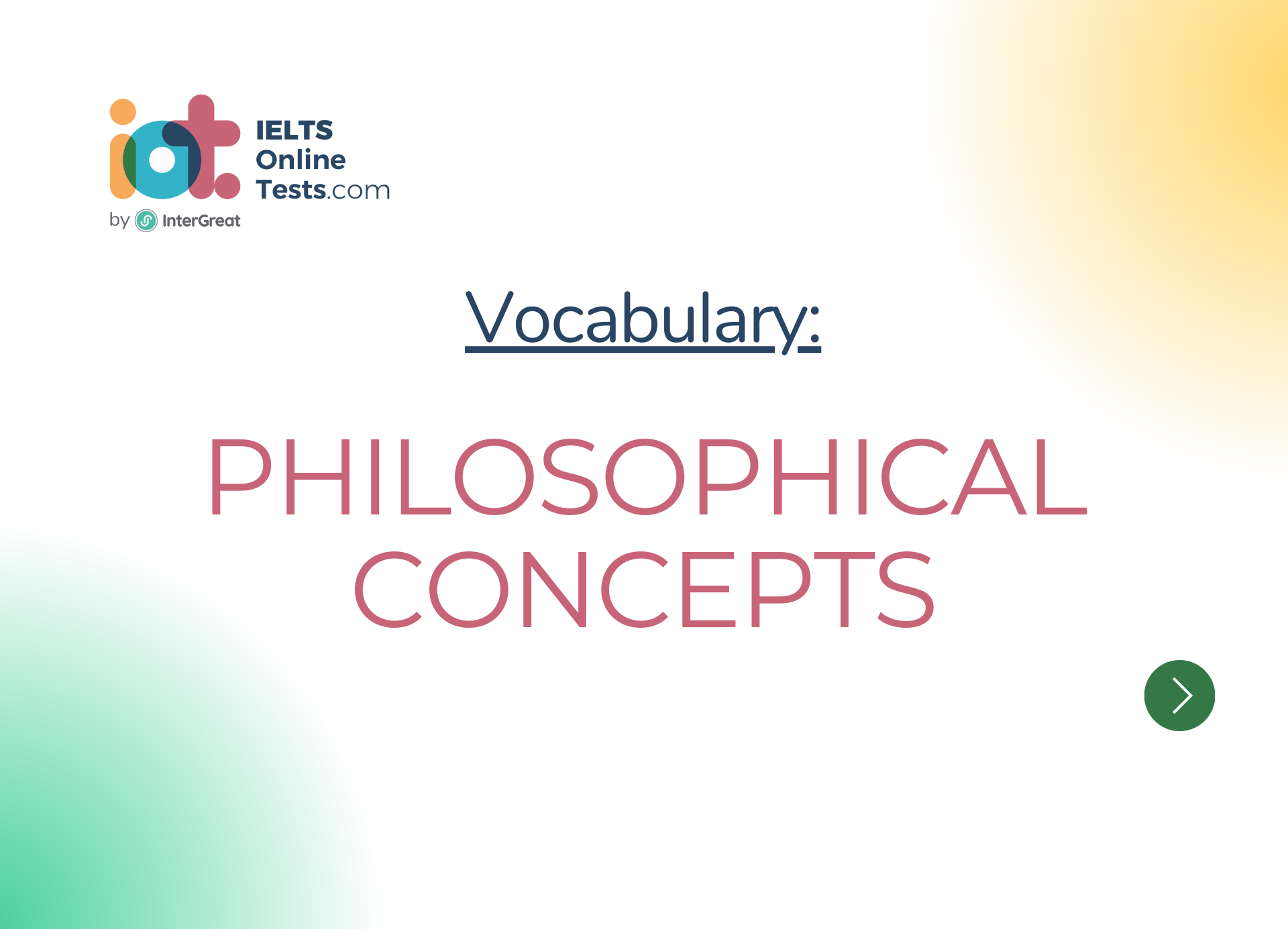
Philosophical concepts
Below is a comprehensive list of vocabulary related to "Philosophical Concepts," which will help you discuss abstract ideas and principles in philosophy in English, suitable for the IELTS band score range of 6.5-8.0:
Metaphysics:
Definition: The branch of philosophy that deals with the fundamental nature of reality, existence, and being.
Example: In metaphysics, philosophers explore questions about the nature of time and space.
Epistemology:
Definition: The study of knowledge, including its nature, scope, and limitations.
Example: Epistemology examines how we acquire knowledge and determine its reliability.
Ethics:
Definition: The branch of philosophy that deals with moral principles, values, and the concept of right and wrong.
Example: Ethical theories like utilitarianism and deontology are explored in ethical discussions.
Aesthetics:
Definition: The study of beauty, art, and the principles of artistic appreciation.
Example: Aesthetics explores the nature of art and the criteria for judging its quality.
Existentialism:
Definition: A philosophical movement that emphasizes individual existence, freedom, and choice.
Example: Existentialism examines the individual's responsibility in creating meaning in an absurd world.
Nihilism:
Definition: The philosophical view that life is devoid of intrinsic meaning or value.
Example: Nihilism challenges the notion of objective morality or purpose in life.
Rationalism:
Definition: The belief that reason and logical thinking are the primary sources of knowledge.
Example: Rationalism asserts that some truths can be known independently of experience.
Empiricism:
Definition: The theory that knowledge is primarily derived from sensory experience and observation.
Example: Empiricism contrasts with rationalism, emphasizing the importance of empirical evidence.
Materialism:
Definition: The belief that only matter and physical entities exist, rejecting the existence of a separate spiritual realm.
Example: Materialism attributes mental states to physical processes in the brain.
Idealism:
Definition: The philosophical view that the mind or consciousness is the primary reality, and the material world is dependent on it.
Example: Idealism posits that the physical world is a manifestation of mental phenomena.
Pragmatism:
Definition: A philosophical approach that assesses the truth of an idea based on its practical consequences and usefulness.
Example: Pragmatism focuses on problem-solving and practical applications of theories.
Skepticism:
Definition: A philosophical attitude that doubts the possibility of certain knowledge and is critical of dogmatic beliefs.
Example: Skepticism challenges claims that lack sufficient evidence or logical justification.
Ontology:
Definition: The branch of metaphysics that investigates the nature and existence of being or reality.
Example: Ontology explores questions about the fundamental categories of existence.
Teleology:
Definition: The philosophical study of purposes, goals, and final causes in natural processes and human actions.
Example: Teleology examines whether there is a purpose or design in the universe.
Hedonism:
Definition: The belief that pleasure and happiness are the ultimate goals of life and morality.
Example: Hedonism evaluates actions based on their potential to maximize pleasure and minimize pain.
Dialectic:
Definition: A method of philosophical inquiry that involves logical argumentation and dialogue between conflicting ideas.
Example: Dialectic reasoning aims to reach a higher level of understanding through the resolution of contradictions.
Epistemological skepticism:
Definition: The position that doubts the possibility of certain knowledge and the reliability of our cognitive faculties.
Example: Epistemological skepticism questions whether we can truly know anything with absolute certainty.
Moral relativism:
Definition: The view that moral principles are not universally valid but depend on cultural, social, or individual perspectives.
Example: Moral relativism asserts that ethical judgments vary across different cultures.
Deontology:
Definition: A normative ethical theory that focuses on the inherent moral duties and principles governing actions.
Example: Deontology emphasizes acting according to universal moral rules, regardless of consequences.
Utilitarianism:
Definition: An ethical theory that promotes actions that maximize overall happiness or utility for the greatest number of people.
Example: Utilitarianism evaluates the morality of actions based on their consequences in terms of happiness or pleasure.
By familiarizing yourself with these philosophical concepts and incorporating them into your discussions or writing, you can demonstrate a strong grasp of advanced academic vocabulary and philosophical ideas, contributing to a higher band score in the IELTS exam. Good luck with your studies!




